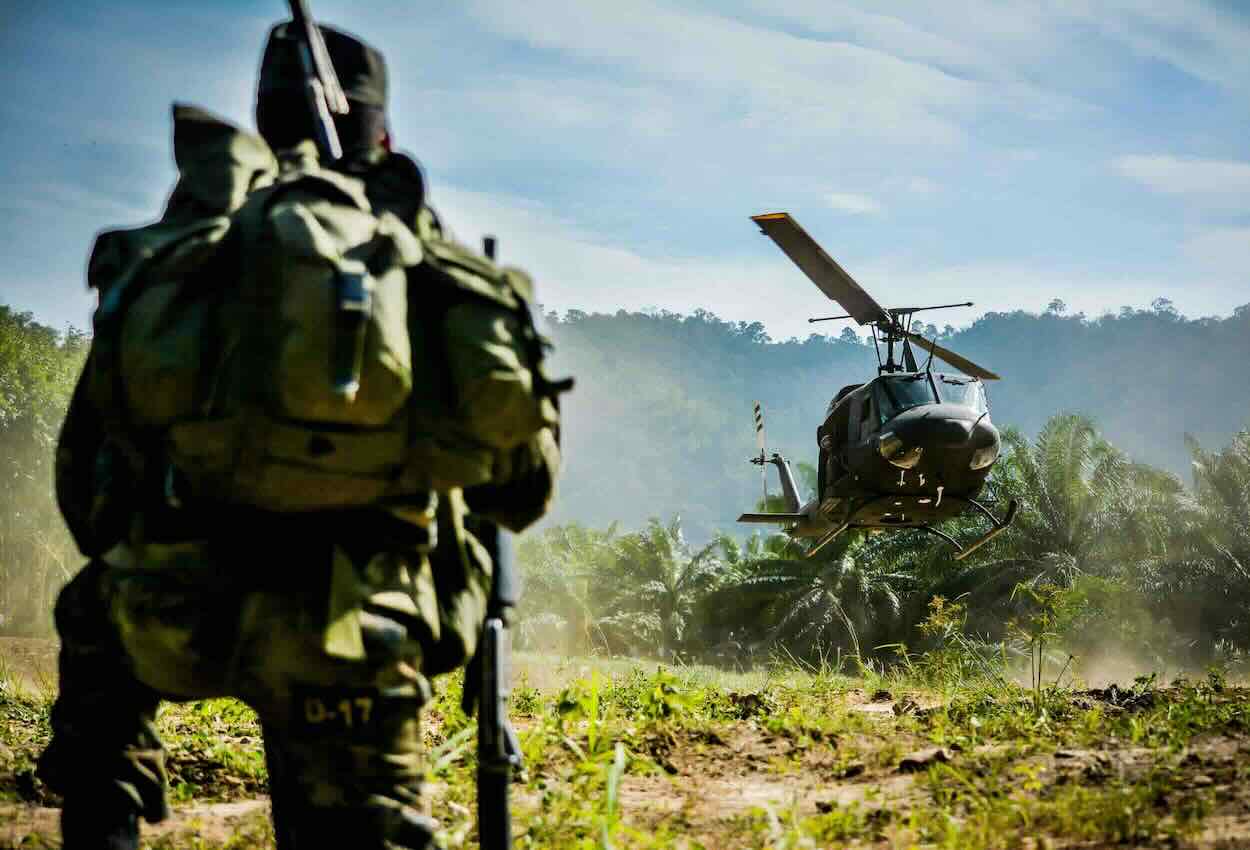„I never saw that as luck. I never wanted to be an agent. It was simply about picking my poison. Once CIA agents got their heads around the extraordinary nature of my desertion, they were so impressed that they wanted to recruit me and offered to close my infamous army file in exchange for my cooperation.“
Mr Claro, your book “Code Peking Duck” tells the story of a young German who drops out of high school in the 1970s and heads to the US, but things don’t go his way so he joins the U.S. Army – although he identifies himself more with the hippie movement, but subsequently is sent to Vietnam, where he deserts and ends up working as a secret agent for the CIA and the BND. If you summarize it like that, it sounds quite exaggerated. But you tell it so realistically that while reading it, we get the feeling that you yourself could be this, Michael Müller. Is that so?
This book is a novel. But you’re right: It contains a lot of autobiographical elements. I experienced most of it myself. Many of the people involved really existed or still do exist.
In the US, the protagonist discovers that it is not that easy to make a living without a job. He gets to know pimps and heroin-addicted prostitutes, he becomes an assistant to a sand painting artist in Los Angeles, works as a seafood process worker in San Diego and finally ends up in the army. Why did you join the army when you were more interested in peace?
The Flower Power “Make Love Not War” in Southern California went on for weeks, where I spent some of the best times in my life. Nevertheless, in contrast to my hippie friends, it was always clear to me that this could only be a temporary phase. After all, I had come to America to go from rags to riches, but not live in a dream world. Unfortunately, the Army recruiters in their neat uniforms were the only ones who offered me regular meals and a real opportunity in my life. Of course, I was afraid of being used as cannon fodder in Vietnam and – at least as bad – of having to shoot other people. But the Pentagon Papers boosted the anti-war movement which had just been published, and so I believed in my recruiters’ prediction that the Vietnam War would be long over by the time I finished my training. A miscalculation …
And how did it happen that you suddenly found yourself in Da Nang, Vietnam, in December 1971?
I was supposed to complete the final part of my practical training as a combat medic in a field hospital in Da Nang. The transfer was sudden and unexpected.
At first, you didn’t think it was that bad in Vietnam, right?
That’s not true. I never wanted to go to Vietnam and actually believed the war would be over once I finished my training. I knew that I could be killed or forced to kill others at any moment. When I set foot on the Vietnamese soil my immediate thought was to desert at the first possible opportunity. My second thought was to make most of the time in Vietnam. I tried to gain substantive amount of medical knowledge at the field hospital and at the same time to cheer up the severely tormented and traumatized patients.

How you deserted is so unbelievable and fascinating that you couldn’t possibly have made it up. Of course, a healthy dose of audacity and a knack for lying came in handy. Did you know beforehand that you could pretend and lie so well?
No. But necessity is the mother of invention. After all, it was a matter of life and death.
You were incredibly lucky because instead of ending up in prison as a deserter, you were recruited as a secret agent. You must explain that.
I never saw that as luck. I never wanted to be an agent. It was simply about picking my poison. Once CIA agents got their heads around the extraordinary nature of my desertion, they were so impressed that they wanted to recruit me and offered to close my infamous army file in exchange for my cooperation.
„My tasks – at least towards the end of 1979 – consisted exclusively of bringing certain escort targets from the Eastern Bloc countries and the Middle East to the West.“
As a secret agent, one of the problems you faced was that your girlfriend became suspicious when you suddenly disappeared for a lengthy period of time and couldn’t provide a reasonable explanation. Did you still like your agent job?
As a rule: no life partner is satisfied with the information that you need to travel for a while on a top-secret mission. They demanded more detail, ideally with evidence, but that would be fatal which would put both partner and mission at great risk. You then must choose either the job or the relationship. This can be very painful, and yes, over time I grew to like the missions, the adventure, the opportunity to travel around the world at US government support, you get to know new cultures, help people with immense difficulties and at the same time make good money.
What were the tasks you had to do for the CIA?
My tasks – at least towards the end of 1979 – consisted exclusively of bringing certain escort targets from the Eastern Bloc countries and the Middle East to the West.
Are you even allowed to talk about it so openly?
The duration of my confidentiality was never specific. The world has changed drastically in the last four decades since my last described deployment. I assume that my revelations won’t stir things up or endanger anyone.
You made a lot of money as an agent. But one day you didn't want to do this anymore. What was it like to suddenly no longer earn such large sums of money?
A comparison with the job of acting comes to mind: Do actors really earn a lot if they get paid 50 grand for a role and then are unemployed for the rest of the year? There were also jobs with much lower or no pay and a few really big ones. An employee on a regular average income does not earn less than that over the years. Between my agent jobs, sometimes simultaneously, I worked in normal, regular jobs as a nurse or paramedic. However, these jobs were, and still are, utterly underpaid. That's why any financial boost was welcome to me. It was only the Bushehr contract, which gained me a royal payment. This allowed me to set up my own company and become independent.
Why did you quit as an agent?
At some point I started a family. However, having a family and being an agent does not go hand in hand. With a family whilst going on missions, you give opportunity to be blackmailed, besides that, you carry responsibility as a partner and father, you can't just die or vanish for a few decades in a foreign prison.

Do you actually feel guilty about anything you've done in your life?
I apologize to the person, whose name is Mike Love in the novel. What I did, 'only' got him into some trouble but for me it was about life and death. I had to be selfish in that situation, overall, what I did on my missions saved many people's lives and I could reconcile that with my conscience. Nevertheless, I am sometimes tormented by the question of whether I have killed someone in my life.
Surely you should have noticed that?
Not necessarily. Once I threw a man who had attacked me off a moving train and another time there was a shootout that suddenly silenced on the other side. I hope that both opponents survived.
Hearing your stories of how you escaped from and resolved complex situations, one must think that you really are a brilliant liar.
The CIA has made lying a true art. To such an extent that at the end of the training, we were even able to outwit a lie detector. But we also had acting lessons. I saw myself more as a role player. The question is, are actors liars because they play doctors or inspectors even though they aren’t? No! the answer is role-playing is their job. I felt the same way about my work. Just a little more secret with risks. The CIA wrote the rough version of their script, but I was allowed to change it as I wanted, play the lead role, and even direct it.
Would you say you have a bit of a criminal streak in you?
What is criminal is a matter of perspective and location. For example, if I drink a glass of whiskey in a hotel in Berlin, Vienna, London, New York or Toronto, that is not a crime. If I drink the same whiskey - brought with me or purchased on the black market - in a hotel in Tehran, it is highly criminal according to local law and is punished with 80 lashes. In the event of a repeat offense, there is a risk of the death penalty. In addition, the zeitgeist determines what is criminal. If I had been exposed during one of my missions in what was then Czechoslovakia or Bulgaria in the 1970s, it would have sent me into prison for many unpleasant years. Today the borders are open, and my “crime” no longer exists.
During your time as a hippie, soldier and secret agent, you were involved with many people. But you appeared with different identities. Have you ever met a person who knew you under a different identity?
No, never. At least not unintentionally.

Your craziest story is the one with the nuclear power plant in Bushehr on the Persian Gulf. You were supposed to take 140 Germans, who worked there, out of the country against the will of the Iranian ruler, Ayatollah Khomeini. During this mission, did you ignore the fact that you had taken responsibility for 140 human lives?
For me, it was just a job that I wanted to complete in the best possible way using all my skills and knowledge. During a flight, a pilot doesn't always think about how many lives he is responsible for, but simply concentrates on flying.
Is it possible that this mission has remained secret to this day?
Yes! And I'm proud of that and the few people who were involved at that time can be too. I am convinced that only strict secrecy made the completion of this mission possible. Nine weeks later, the hostage-taking which took place at the US embassy in Tehran, was immediately on the news worldwide and lasted 444 days.
You have experienced crazy things that practically cannot be topped. Are you sometimes bored today? Are you longing for the thrills of the old days?
Boredom doesn’t exist to me. Missions as described in the book would no longer be possible or necessary today. There's a time and a place for everything.
Can we still hope for further adventures from agent Michael Miller?
In the 1980s I travelled several times on behalf of the CIA to the Middle East and Central America. If “Code Peking Duck” is well received by readers, I might write down a few more of my experiences.
What brings you joy in life?
Freedom – family – flying! I always enjoy launching into the sky, whether with a parachute, paraglider, balloon, helicopter, gyrocopter, biplane or just in a small Cessna. Traveling and adventuring together with my family are and will remain the highlights in my life. You especially appreciate freedom when you haven't had it for a while. I have been imprisoned several times in my life, two cases are described in my book.